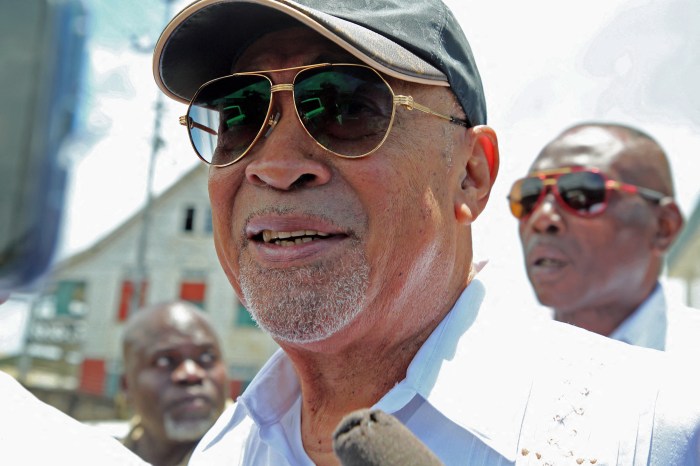By Chris Kirkham, Fanny Potkin and Neil Jerome Morales
(Reuters) – Juul Labs Inc is halting sales in Indonesia, citing concerns that it can’t stop retailers from selling its high-nicotine e-cigarettes to young people in a largely unregulated tobacco market.
Juul disclosed its Indonesia plans to Reuters as the news organization was inquiring about the company’s marketing to younger customers there and in the other two Asian countries where it operates – the Philippines and South Korea. A Reuters review of Juul’s Asia marketing found that the firm has promoted e-cigarettes in ways similar to those that raised the ire of regulators in the United States.
Juul said in a statement that it would suspend Indonesia sales “indefinitely” until it could ensure that online and traditional retailers there will “increase and enforce age restrictions and compliance measures.”
The firm’s decision to retreat from the world’s fourth most populous nation – which has not been previously reported – marks a major setback for Juul’s larger plans to expand in Asia. The region has been seen as critical to the company’s growth amid mounting U.S. legal and regulatory problems over its role in the nation’s youth vaping epidemic.
Juul had launched in Indonesia just seven months ago because it was attracted to the nation’s permissive regulatory environment, according to a former employee and another source familiar with its Asia sales strategy. The company had targeted customers aged 19 to 35, according to those two sources and a current Juul employee.
A Juul spokesman said the company only wants adult smokers to use its products.
The Indonesia decision comes after Juul said last month that it was “reviewing our strategies and operations” in South Korea – where the company has faced regulatory scrutiny – because of disappointing sales. Juul has also held off on planned expansions in the Netherlands and New Zealand. The company said it is taking a “methodical approach” in reviewing its overseas operations on a country-by-country basis.
In Asia, Juul has continued to sell the fruit- and dessert-flavored nicotine “pods” that it has voluntarily pulled from U.S. store shelves amid a hail of criticism over their appeal to youth. In Indonesia, Juul has marketed its products in movie theaters and malls frequented by young people, selling its e-cigarettes at kiosks and in sleek, Juul-branded retail shops that mimic Apple stores. The firm has also hired “ambassadors” – often attractive young women – to promote Juul in bars and nightclubs. As recently as last month, Juul was installing kiosks in Jakarta office buildings catering to young tech employees and running advertisements for Juul flavors in office elevators.
Retailers in Indonesia and the Philippines have allowed online sales of Juul devices and pods with no age verification, according to a Reuters review of Juul products advertised for sale on Asian e-commerce platforms. Juul said it did not authorize any sales without verification and has a team that works to remove unauthorized online listings.
Juul did not answer detailed questions from Reuters about its Asia marketing efforts and their appeal to young people. The company said in a statement that it is “committed to advancing the long-term potential for harm reduction for adult smokers while combating underage use.”
In recent months, the company’s stricter approach to marketing in the United States has made it difficult for those in overseas markets such as Indonesia to market in the same way and meet sales targets, the employee said. The company has taken a more cautious approach to international expansion under new CEO K.C. Crosthwaite, the person said, compared to an earlier approach of opening new markets as fast as possible.
The company is exploring expansions in Vietnam and Japan later this year, the employee said. A Juul spokesman confirmed the company is monitoring the regulatory environment in Vietnam but said it currently has no plans to launch there. The spokesman declined to comment on Japan.
A LOSING BET ON INTERNATIONAL MARKETS
International expansion has been seen as crucial to Juul’s future as the company’s U.S. problems have caused investors to slash growth forecasts. Marlboro maker Altria Group Inc – which bought a 35% stake in Juul Labs Inc in December 2018 for $12.8 billion – has since marked down its value by a total of $8.6 billion.
Altria executives were initially bullish on Juul’s international prospects. In an earnings call soon after the Juul deal, Altria CEO Howard Willard said he expected Juul’s international revenue and profits to eventually be “as large as or larger than the U.S. opportunity.”
Those prospects have dimmed, however, as some overseas regulators took note of the widespread criticism of Juul in the United States. India banned e-cigarettes last fall, citing the U.S. epidemic of youth use, and countries such as Malaysia are considering similar restrictions.
But Indonesia – until now – had been seen as one of the company’s biggest opportunities. The country of nearly 270 million people has among the world’s highest smoking rates and weakest regulations, imposing no penalties for selling cigarettes to minors.
In an interview with Reuters in July, when Juul launched in Indonesia, the company’s executive running the Asia Pacific region, Ken Bishop, acknowledged that attracting young adult smokers was important to its success there.
“That is typically where we see the initial interest,” he said, adding that eventually the product would appeal to “any demographic” including longtime smokers.
Bishop also emphasized the importance of preventing sales to teenagers.
MARKETING AT MOVIES, DANCE CLUBS
Just before a November screening of the movie Charlie’s Angels in downtown Jakarta, Indonesia, teenagers who filled the theater watched one ad for an e-commerce site that featured Korean boy band BTS, another for spicy instant noodles, and a third for Juul e-cigarettes.
“Odor-free, tar-free, mess-free,” the voiceover said as colorful displays of mint and mango flavors for the “#1 Vaporizer in America” flashed across the screen.
Juul said that Charlie’s Angels was a 17-and-up film in Indonesia and that it has stopped cinema advertising in the last two months. Juul did not answer questions on what age group it aimed to reach with the movie ads or why it stopped them.
Juul hired its 150 “brand ambassadors” through a marketing firm to promote its products in night clubs, restaurants, supermarkets and convenience stores, according to the three people familiar with its Asia marketing strategy. Through a contract with Indonesian marketing firm Nava Plus, the ambassadors charged 2000 rupiah (the equivalent of $0.15 in U.S. dollars) for sample hits on a Juul at places such as the swanky Omnia Bali nightclub. Nava Plus did not respond to requests for comment.
Such efforts reflected the goal of reaching customers in their 20s and early 30s by pitching the device as a trendy lifestyle product, according to the three sources. The campaign mirrors early U.S. promotions at music festivals and other events catering to young people, which have since become a focus of government investigations into Juul’s marketing.
Juul has denied it ever targeted teenagers in any country, but the company has acknowledged that those early U.S. campaigns focused on young adults aged 25 to 34 – a strategy company executives later called a mistake.
Instagram posts last August promoting Juul’s largest Asia store in Town Square Cilandak, a Jakarta mall, evoked a club scene, with dance music playing in the background of a promotional video with the staff, and slogans reading “come now and feel the experience.” Juul said the Instagram post was developed by the mall, not the company, without explaining how Juul store employees were featured without its consent. The company said it requested that the post be taken down after Reuters inquired about it.
The Town Square store is located across from an ice cream shop. Near another Juul store, in the upscale Plaza Indonesia, a miniature train takes children through the mall.
Juul has also launched its own branded stores and kiosks in Indonesia, South Korea and the Philippines, which have a sleek, modern vibe. Buyers can engrave their names for free on Juul devices, and the shops are staffed by vendors who are typically in their 20s, wearing black-and-white uniforms embroidered with the Juul logo. They almost invariably serve customers about the same age, three clerks at Juul stores in popular Jakarta malls told Reuters.
The flavors Juul stopped selling in the United States amid criticism remain a hit among young Juulers in Asia. Sungwon Cho, a 26-year old photographer in Seoul, started using Juul in April because it was more convenient than traditional cigarettes and “didn’t smell bad.”
“I like the sweet taste,” he said. “It feels like I am vaping a candy or jelly.”
(Reporting by Chris Kirkham in Los Angeles, Fanny Potkin in Jakarta and Neil Jerome Morales in Manila. Additional reporting by Sangmi Cha in Seoul, and Stanley Widianto and Jessica Damiana in Jakarta.; Editing by Vanessa O’Connell and Brian Thevenot)





















